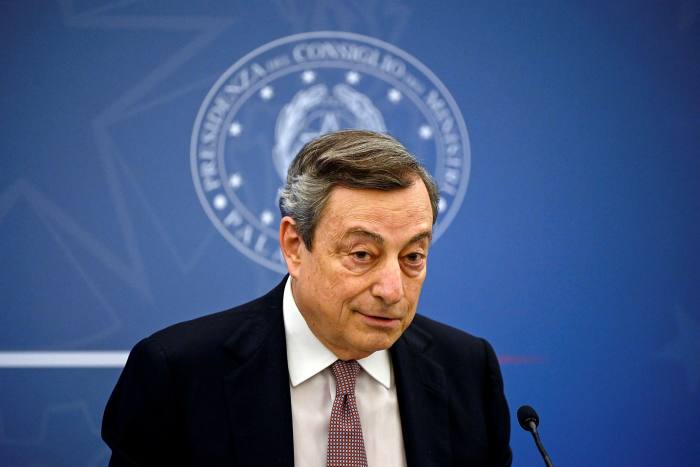Germany said it had sealed a long-term agreement with Qatar for the supply of liquefied natural gas as Berlin seeks alternative energy suppliers to Russia.
In Doha as part of a Gulf tour, Germany’s economy minister Robert Habeck on Sunday said the deal would be a “door-opener” for the country’s economy because it would reduce its reliance on imported Russian gas, which currently accounts for more than half of annual supply.
He declined to provide details on the quantities and other terms discussed. The ministry said it would be up to individual German energy companies, the bosses of which have accompanied Habeck on the trip to Qatar, to sign deals with the Arab state’s enterprises.
“We might still need Russian gas this year, but not in the future,” Habeck was quoted as saying by DPA in Doha. “It starts like this — so he who has ears should start to listen,” he said, in a thinly veiled message to Russian president Vladimir Putin.
Qatar welcomed in a statement Germany’s decision to “fast-track” the development of two LNG terminals and said the countries’ “respective commercial entities would re-engage and progress discussions on long term LNG supplies from Qatar to Germany”.
Germany’s move comes as EU leaders prepare to meet in Brussels on Thursday to discuss how to respond to the shock of rising energy prices, which have been exacerbated by the Ukraine war and a desire to wean themselves off Russian gas following Moscow’s invasion of Ukraine.
Berlin’s coalition government has ruled out prolonging the life of Germany’s remaining nuclear plants, which are due to be switched off at the end of the year, and is pinning its hopes on LNG terminals to reduce the amount of gas it imports via pipelines from Russia.
Aside from efforts to find alternative suppliers of energy, EU governments are seeking to shield households and businesses from rising energy costs.
On Sunday, Austria announced that it was going to spend €2bn to subsidise energy costs for its citizens.
On Friday, Italy said it aimed to raise €4.4bn by levying a 10 per cent tax on increased profits reported by companies between October 2021 and March 2022 compared with the previous year, if that increase exceeds €5mn.
With the new tax, Italy intends to cut duties at the petrol pump by 25 cents a litre until the end of April, and shield the country’s 5.2m poorest families from further increases in their household energy bills. Energy companies that are likely to be hit by the tax include Eni and Enel.
“We will tax part of the extraordinary profits that companies are making thanks to the increase in the costs of raw materials, and redistribute this money to businesses and families in difficulty,” said Prime Minister Mario Draghi.
Italy has already spent €16bn since last summer to try to shield poor families and small businesses from surging energy costs.
However, the Italian business lobby, Confindustria, called Rome’s initiative “disappointing” and warned that the windfall profit tax was “potentially against the Constitution”. The CISL, or Italian Confederation of Workers’ Trade Unions, called the 10 per cent excess profit tax “too low” and urged an increase.

Italy is not alone in turning to energy companies’ windfall profits. The Labour party in the UK is pressing for a tax on North Sea oil and gas companies, which would otherwise reap massive financial rewards from the current price surges. In September, Spain introduced a windfall tax on energy companies but revised it after industry pressure, reducing the amount it was due to raise.
Electricity pricing is also set to be a contentious issue at the upcoming EU summit. Southern member states are pushing for changes to the way wholesale markets function, to alleviate pressure on households but are facing strong resistance from northern Europe.
Spain and Italy both want to see the EU change its electricity pricing rules, which have effectively linked the price of electricity to the soaring cost of gas, and allowed renewable energy groups to charge well above cost.
Rome and Madrid are also pushing for the EU to jointly negotiate on energy purchases to get better deals, particularly for piped gas coming from Russia, which would reduce payouts to Russian energy companies.
“I cannot say this would be the optimal moral solution, but it would have an impact,” said Roberto Cingolani, minister for ecological transition.
The like-minded leaders of Italy, Spain, Portugal and Greece have been engaged in intense diplomacy, meeting last Friday to try to build momentum for their proposed energy market reforms.
That night, Spanish prime minister Pedro Sánchez dined with German chancellor Olaf Scholz — one of the key figures Madrid needs to convince — and Sánchez is due to travel to Paris to meet French president Emmanuel Macron on Monday.
However, diplomats warn that there is no consensus on any of these market reforms, which some say could undermine incentives for fresh investment in renewable energy. Some countries such as the Netherlands argue that the near-term focus should remain on saving energy and filling up gas storage facilities.
Additional reporting by Sam Fleming in Brussels, Daniel Dombey in Madrid and Andrew England in London
https://news.google.com/__i/rss/rd/articles/CBMiP2h0dHBzOi8vd3d3LmZ0LmNvbS9jb250ZW50LzExOTI1MTdiLWU0MDUtNDg2Zi1hNzQzLTUxYjViZTM1NjAyNNIBAA?oc=5
2022-03-20 17:06:11Z
1328974437
Tidak ada komentar:
Posting Komentar